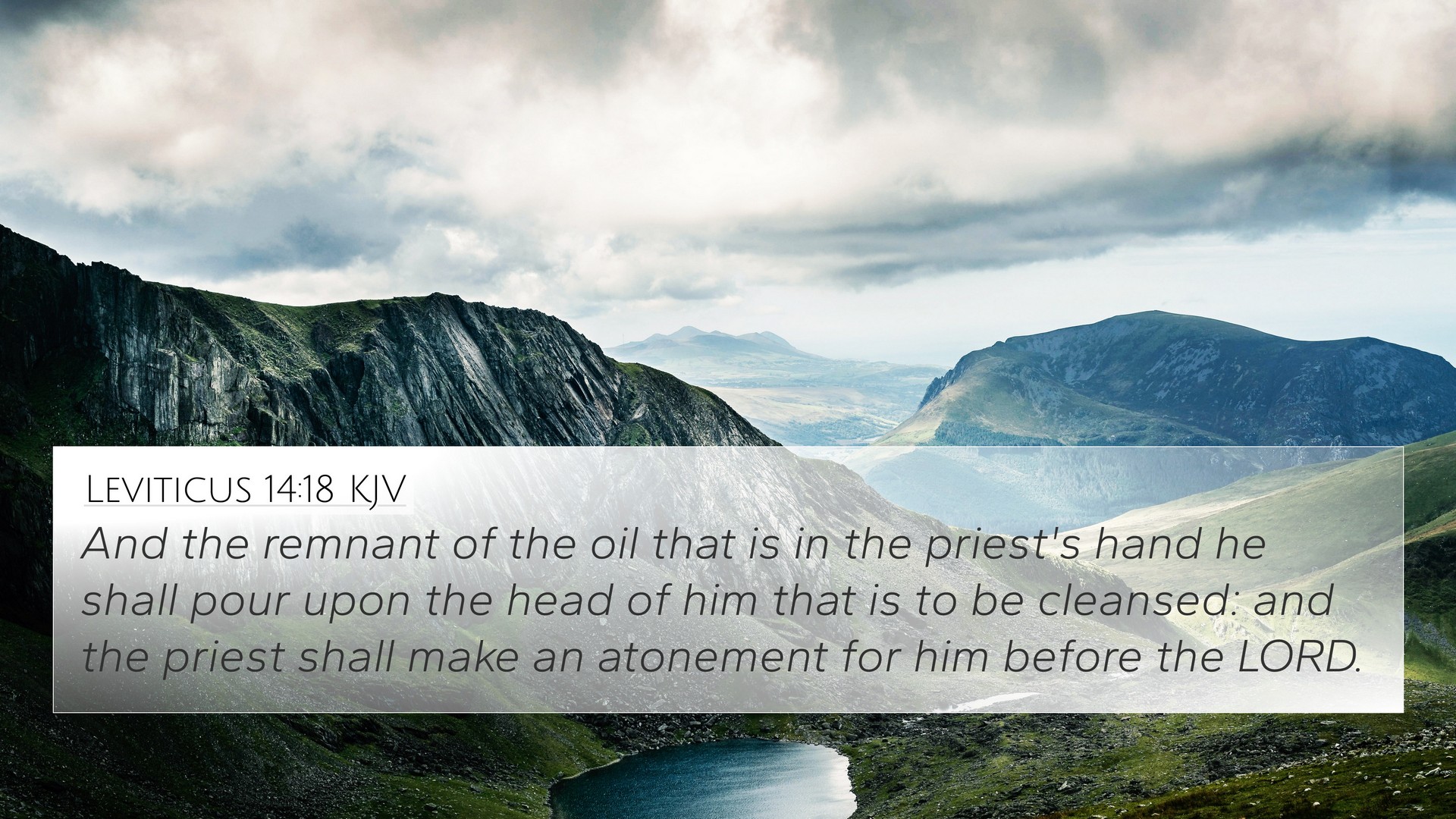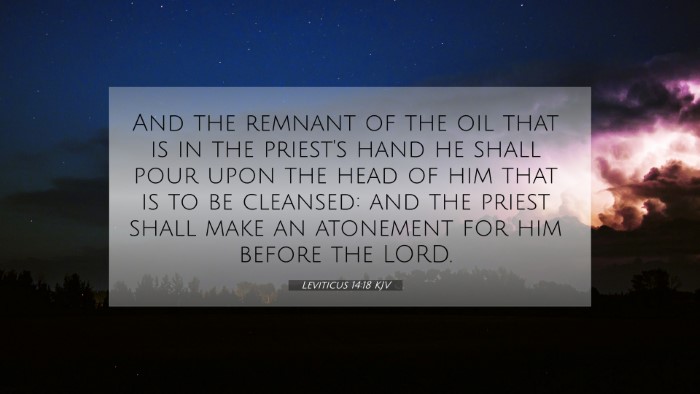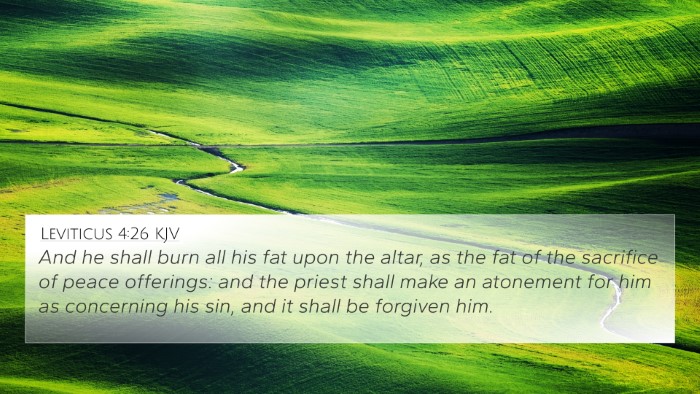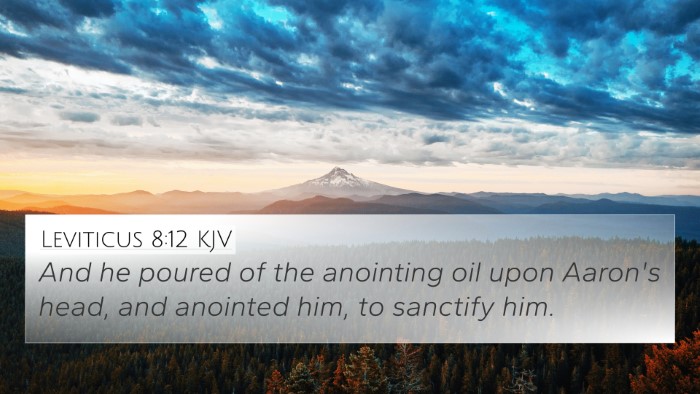Understanding Leviticus 14:18
Leviticus 14:18 states: "And the rest of the oil that is in the priest’s hand he shall pour upon the head of him that is to be cleansed: and the priest shall make an atonement for him before the Lord." This verse highlights the intricate relationship between ritual cleansing and atonement within the context of ancient Israelite law.
Summary of the Verse
This passage focuses on the ceremonial cleanings necessary for those who have been afflicted with leprosy or a similar skin disease. The oil in the priest's hand symbolizes God's healing and the renewal of the individual, showcasing the connection between physical and spiritual restoration.
Commentary Insights
Drawing on insights from public domain commentaries, this section elaborates further on the deep meanings behind this scripture:
-
Matthew Henry:
Matthew Henry emphasizes that the act of pouring oil on the cleansed individual signifies the Holy Spirit's anointing and the transformation that occurs through God's intervention. The oil also represents joy and gladness, indicating that healing is cause for great rejoicing.
-
Albert Barnes:
Albert Barnes points out the importance of the priest in this process. He acts as a mediator between God and man, which underscores the significance of priestly functions in the Old Testament. The act of atonement is vital as it restores the individual not only physically but also spiritually.
-
Adam Clarke:
Adam Clarke discusses the communal aspect of the ceremony. The cleansing involves the community as a whole and not just the individual. This notion signifies that sin, disease, and healing impact the broader society.
Bible Verse Cross-References
Leviticus 14:18 connects to several other passages in the Bible. Here are some notable cross-references:
- Leviticus 14:10 - The detailed instructions for bringing the offerings highlight the need for atonement.
- Hebrews 9:22 - "Without the shedding of blood, there is no remission," correlating atonement with blood sacrifice.
- Mark 6:13 - The apostles anointed many sick people with oil, echoing Levitical practices.
- James 5:14 - Signals the prayer and anointing of the sick, resonating with themes of healing and atonement.
- Psalms 23:5 - "You anoint my head with oil," indicating a figure of divine favor and restoration.
- Isaiah 61:1 - The anointing for the healing of the broken-hearted connects to spiritual and physical recovery.
- 1 Peter 2:9 - The concept of a royal priesthood indicates the continuation of priestly roles in the New Covenant.
Thematic Bible Verse Connections
Various themes emerge from Leviticus 14:18, providing a rich field for inter-biblical dialogue and comparative analysis:
-
Atonement and Cleansing: The primary theme is atonement through cleansing rituals, which recur throughout the biblical narrative.
-
Healing and Restoration: Healing encompasses both physical ailments and spiritual restoration, as seen in passages relating to Jesus’ healings.
-
Priestly Mediation: The priest's role in this ritual emphasizes the need for intermediaries between God and humanity, leading to reflections in New Testament texts about Christ's priesthood.
Tools for Bible Cross-Referencing
Understanding connections between Bible verses can be deepened through various tools:
- Bible Concordance: A reference book or software that helps locate specific verses and their themes.
- Bible Cross-Reference Guide: A resource for identifying verses that correlate with specific themes or topics.
- Cross-Reference Bible Study: Various methods that involve searching and integrating related scriptures.
Why Cross-Referencing Matters
The practice of cross-referencing Bible verses enriches the study of Scripture by:
- Enhancing understanding through connections.
- Revealing intricate Biblical themes.
- Providing deeper insights into God’s redemptive plan.
Conclusion
Leviticus 14:18 serves as a seminal verse that encapsulates themes of cleansing, atonement, and the priestly role in ancient Israel's worship system. By analyzing this verse in conjunction with cross-references and insights from various commentaries, one can gain a more profound understanding of its implications, both historically and spiritually.









